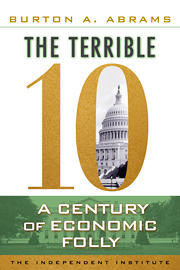My new Mercury outboard motor came with the following warning: “It is recommended that only alcohol-free gasoline be used where possible.” Gasoline blended with ethanol, an alcohol, does some nasty things to small motors. It corrodes metal, deteriorates plastic and rubber parts and creates difficulties with starting and operating the motors. Fuel lines have been known to leak, causing obvious dangers to operators. Where’s the Consumer Protection Agency when you need it? Not only won’t the government protect us consumers, it caused the problem.
Government legislation mandates the blending of ethanol into most gasoline sold in the United States and has set ever increasing amounts of ethanol to be phased in over time. This policy is an ill-advised attempt to reduce U.S. dependence on oil and to shift automotive fuel to a renewable source. Mandating the use of ethanol imposes more costs than benefits, including hidden costs on consumers that hit the poorest members of society worst, and provides billions of dollars in lucrative business to grateful campaign-donating special-interest groups. Making matters worse, supporters of ethanol make highly questionable claims about its environmental benefits. Ethanol’s got to go.
Ethanol can be made from various plant materials, but in the U.S. ethanol is made primarily from corn. In 2012/2013, approximately one-third of the U.S. corn crop went into ethanol production. U.S. annual production of ethanol has surged since 1998, increasing from slightly over one billion gallons to over 13 billion gallons in 2012. This surge in production and consumption is the result of state and federal mandates requiring it to be blending with gasoline.
The ethanol mandate has increased food prices, as the surge in demand from ethanol production has raised corn prices and corn profitability. Lands previously planted with other grain crops have been shifted into corn production, lowering supplies of other grains and raising their prices. Livestock that feed on higher-priced grains have had their costs of production and prices go up as well. These higher prices for food items are a “tax” on consumers—financial burdens that fall disproportionately on lower-income families whose budgets are heavily weighted towards food items. One nice benefit to politicians is that explicit agricultural crop subsidies have fallen as grain prices have gone up. In essence, the government has been able to legislatively shift the burden of the agricultural subsidy programs off the budget and onto consumers in the form of higher food prices.
The environmental benefits of corn-based ethanol are in doubt. While ethanol is an oxygenate that allows for the cleaner burning of gasoline, it comes with various other environmental costs. The environmental costs to manufacture and distribute ethanol are usually neglected by its proponents; increased grain output requires the use of more fertilizers, insecticides and ground water. Agricultural water runoff also imposes environmental costs, as does the diesel and gasoline farm machinery requires to grow corn. Ethanol is costly to transport since it is unsuitable for most pipelines, requiring other types of ground transportation that use fossil fuels as well. Drivers using gasoline blended with ethanol find their cars’ miles-per-gallon fall, so more gallons of blended gasoline are needed for traveling any given distance. All told, the environmental costs from using corn-based ethanol may be higher than using straight gasoline.








